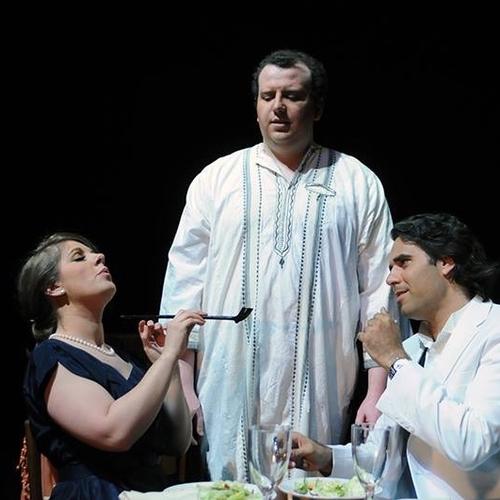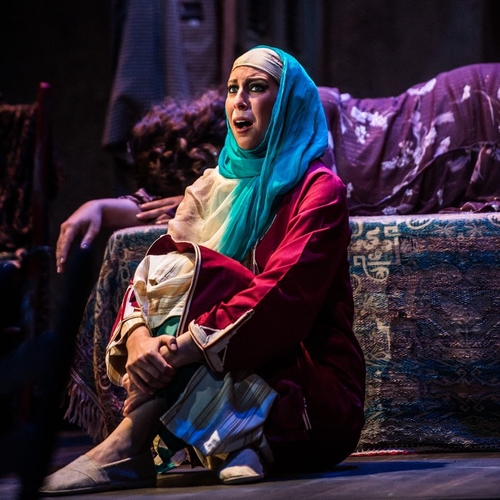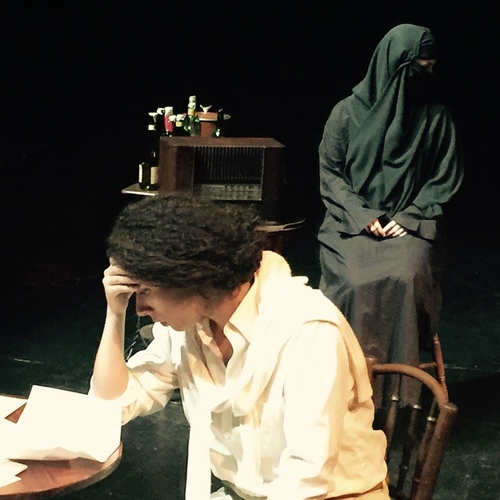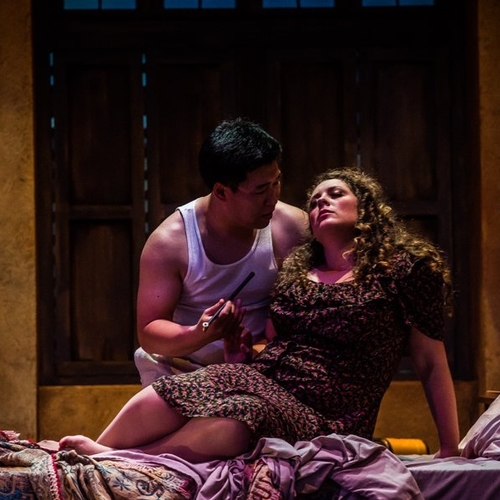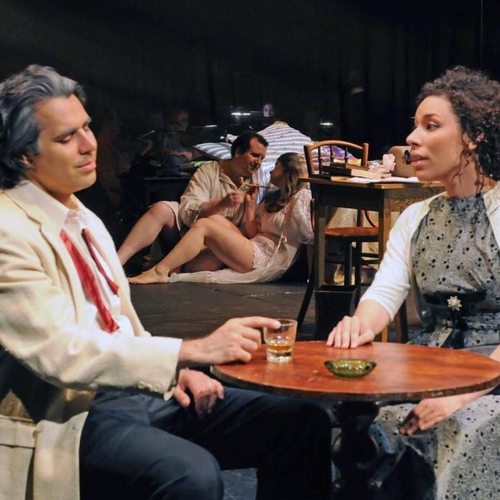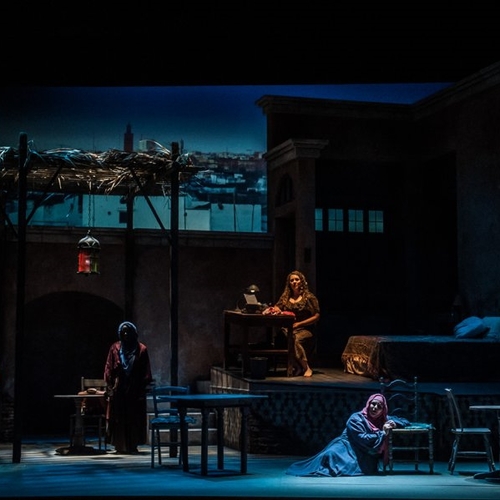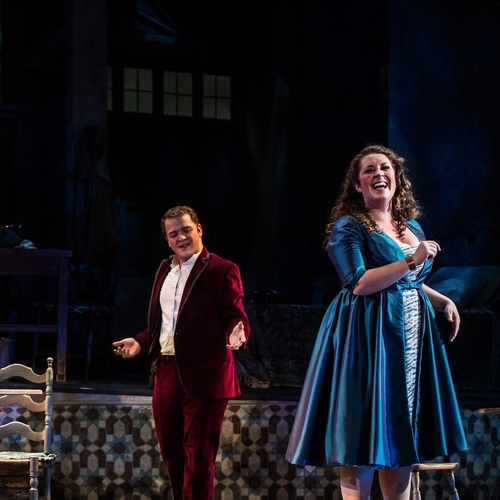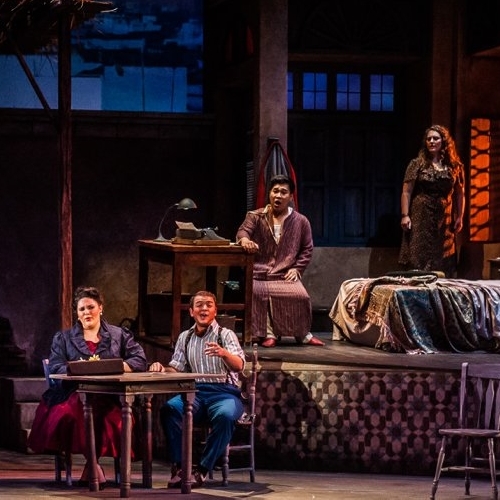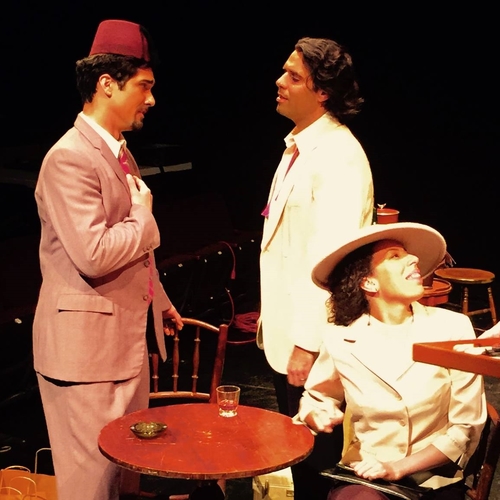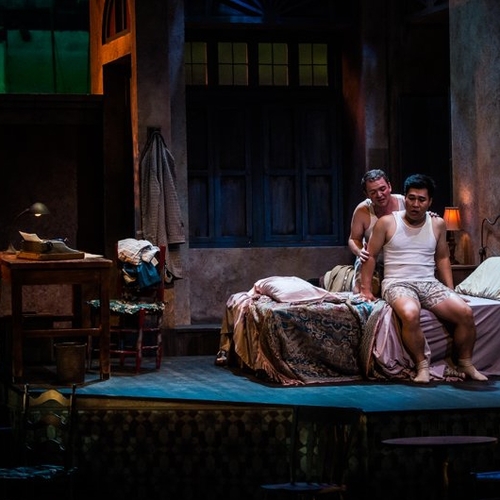An opera
Duration: 120 minutes
Music Text
Libretto by Barbara Grecki and Daron Hagen based on the play by Barbara Grecki (E,F)
Scoring
- Original version (24 players): solo voices: Lr-S, S(2), Mez-So(2)T, Bar, Bass-Bar; treble choir; fl(=picc).ob(=CA).cl(=Ebcl.bcl).bn-pft(=synth)-hn-perc-timp-str(4.4.3.3.2 players)
- Condensed version (13 players): solo voices: Lr-S, S(2), Mez-So(2)T, Bar, Bass-Bar; NO treble choir; fl(=picc).ob(=CA).cl(=bcl).bn-pft-perc-timp-2vln.vla.vlc.cb
Peermusic Classical (Burning Sled Music)
Territory
This work is available from Peermusic Classical for the world.
World Premiere
June 23, 2015, Actors Theater of Louisville, Louisville, KY
Daron Hagen, director
Conductor: Roger Zahab
Company: Kentucky Opera
Roles
Lizzy Holmes / Woman #4 (Lyr-S)
Asilah / Woman #1 (S)
Habiba / Woman #2 (S)
Clare Holmes / Woman #3 (Mez-S)
Trafficked Woman / Woman #5 (Mez-S)
Ahmed (T)
Teddy Forsythe (Bar)
Harry Hopkins (Bass-Bar)
Treble Choir (Woman #1-#5; either doubled as above or as an independent corps of 5-10 treble voices)
Time and Place
The courtyard, stairs, and a guest room at the Cypress, a pensione in Tangiers, Morocco, in October 1958.
Synopsis
When she checks in to the Cypress, a run-down pensione in Morocco, the life of Lizzy Holmes, a young American travel writer, unravels. She becomes entangled in the world of its denizens, all of whose lives orbit Ahmed, a charismatic, handsome, morally pliable Tunisian. Teddy, a dissolute English expat, owner of the Cypress, keeps Ahmed in his employ to satisfy all desires. Not knowing that Ahmed is married to Asilah, an Arabic woman who was trafficked, sold, branded in shame, Lizzy befriends her and helps her to learn English. The ensuing love triangle fuels Lizzy’s self-destructive submission to aphasia and drugs. A plan devised for Asilah to leave the country ends in betrayal and death. Alerted to Asilah’s tragic death by Lizzy’s increasingly distressing letters, and drawn to Morocco by her concern for her, Clare, Lizzy’s older sister, arrives in Tangiers in the company of Harry Hopkins, an American businessman she met in Paris. She does not know that Teddy and Harry traffic together in young Arab girls. Ahmed discovers that Harry is responsible for the rape of his wife. He draws a knife and attempts to avenge Asilah’s death. Teddy, who has signed ownership of the Cypress over to Ahmed as an expression of his love for him, takes the knife, and plunges it into Harry’s chest. Teddy is arrested, but confident of his release. Lizzy has vanished. Clare, determined to find Lizzy, remains at the Cypress, with Ahmed.
Production Stills
Here
Links
Wikipedia | Soundcloud
Selected Press
“A Woman in Morocco spins a complicated tale over two fast-paced acts. Hagen’s multilayered score shifts nimbly and deftly, never foresaking tonality though unafraid to employ some modernist expressionism or minimalist simplicity when needed. In numerous vocal ensemble moments — intriguingly presented at times with some singers offstage accompanying onstage singers — Hagen offered shimmering, lyrically rich sounds.” — Jeanne Claire van Ryzin, Austin360.com
“Intimate and grimy, [it] makes you feel as if you are a part of the action. ... The choral vocal lines are some of the most hauntingly lovely harmonies that I’ve ever heard. A Woman in Morocco is an enjoyable piece with a serious social overtone. Thank you for your bravery in producing it.” — Annette Skaggs, Arts-Louisville.com, 13 May 2015
“Hagen traffics all but exclusively in acoustic tonality, so when I heard that electronic elements were involved in this production I was very interested to hear how he would approach it. Consisting of pre-recorded and digitally manipulated sounds, including those natural (rain and thunder) and human (ululations, vocal glissandi, and a jazz trio presented as a shortwave radio broadcast), each electronic addition was subtle and organic and added an extra dimension to the proceedings.” — Andrew Sigler, NewMusicBox.com
“Hagen’s complex score works to underline issues with leitmotifs, musical cues assigned to different characters, and music that never settles or rests. When singers get soaring arias, they emerge naturally from this intricate texture. Hagen has a gift for writing sensually rich tunes and uses this skill to release the music at important moments.” — Selena Frye, Louisville.com

